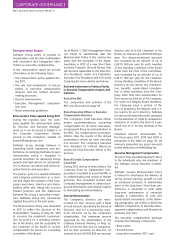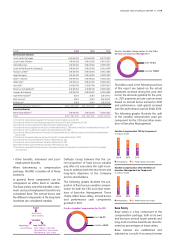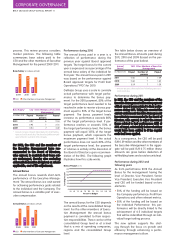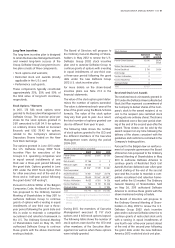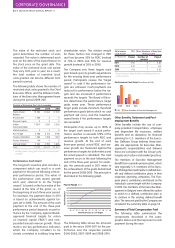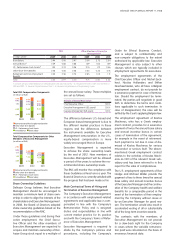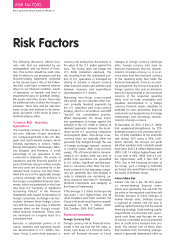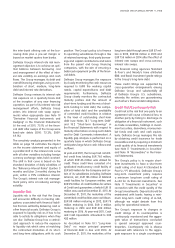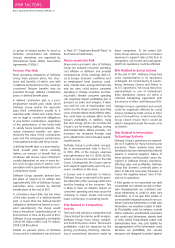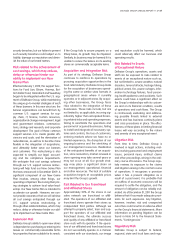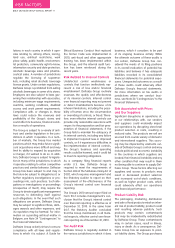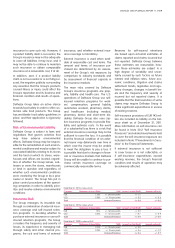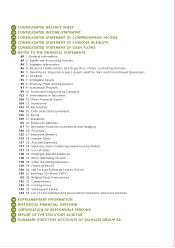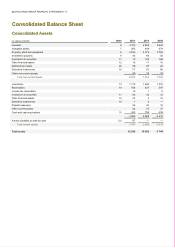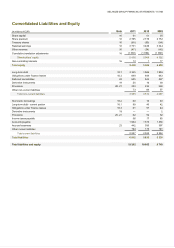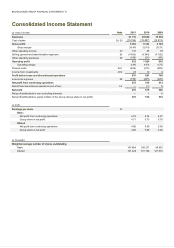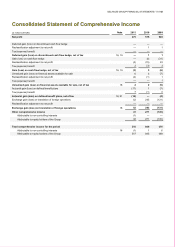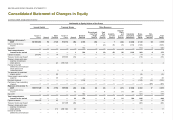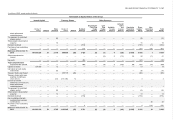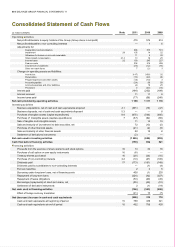Food Lion 2011 Annual Report Download - page 60
Download and view the complete annual report
Please find page 60 of the 2011 Food Lion annual report below. You can navigate through the pages in the report by either clicking on the pages listed below, or by using the keyword search tool below to find specific information within the annual report.
lations in each country in which it oper-
ates relating to, among others, zoning,
land use, antitrust restrictions, work
place safety, public health, environmen-
tal protection, community right-to-know,
information security and date protection,
alcoholic beverage sales and pharma-
ceutical sales. A number of jurisdictions
regulate the licensing of supermar-
kets, including retail alcoholic beverage
license grants. Under certain regulations,
Delhaize Group is prohibited from selling
alcoholic beverages in some of its stores.
Employers are also subject to laws gov-
erning their relationship with associates,
including minimum wage requirements,
overtime, working conditions, disabled
access and work permit requirements.
Compliance with, or changes in, these
laws could reduce the revenues and
profitability of the Group’s stores and
could affect its business, financial condi-
tion or results of operations.
The Group is subject to a variety of anti-
trust and similar legislation in the juris-
dictions in which it operates. In a num-
ber of markets, the Group has market
positions which may make future signifi-
cant acquisitions more difficult and may
limit its ability to expand by acquisition
or merger, if it wished to do so. In addi-
tion, Delhaize Group is subject to legisla-
tion in many of the jurisdictions in which
it operates relating to unfair competitive
practices and similar behavior. Delhaize
Group has been subject to and may in
the future be subject to allegations of, or
further regulatory investigations or pro-
ceedings into, such practices. Such alle-
gations or investigations or proceedings
(irrespective of merit), may require the
Group to devote significant management
resources to defending itself against
such allegations. In the event that such
allegations are proven, Delhaize Group
may be subject to significant fines, dam-
ages awards and other expenses, and
its reputation may be harmed. For infor-
mation on a pending antitrust matter in
Belgium, see Note 34 ”Contingencies” to
the Financial Statements.
Delhaize Group actively strives to ensure
compliance with all laws and regula-
tions to which it is subject. A Guide for
Ethical Business Conduct that replaced
the former Code was implemented in
2010, anti-fraud and other appropriate
training has been implemented within
the Group, and the internal audit func-
tion has been reinforced during the
recent years.
Risk Related to Internal Controls
Undetected control weaknesses or
controls that function ineffectively rep-
resent a risk of loss and/or financial
misstatement. Delhaize Group routinely
assesses the quality and effectiveness
of its internal controls. Internal control
over financial reporting may not prevent
or detect misstatements because of its
inherent limitations, including the possi-
bility of human error, the circumvention
or overriding of controls, or fraud. There-
fore, even effective internal controls can
provide only reasonable assurance with
respect to the preparation and fair pres-
entation of financial statements. If the
Group fails to maintain the adequacy of
its internal controls, including any failure
to implement required new or improved
controls, or if it experiences difficulties in
the implementation of internal controls,
the Group’s business and operating
results could be harmed, and it could fail
to meet its reporting obligations.
As a company filing financial reports
under U.S. law, Delhaize Group is
required to meet the requirements of
Section 404 of the Sarbanes-Oxley Act of
2002, which requires management and
the Statutory Auditor to report on their
assessment of the effectiveness of the
Group’s internal control over financial
reporting.
The Group’s 2010 annual report filed on
Form 20-F includes management’s con-
clusion that the Group’s internal control
over financial reporting is effective as of
December 31, 2010. In the same Form
20-F, the Statutory Auditor concluded
that the Group maintained, in all mate-
rial respects, effective control over finan-
cial reporting as of December 31, 2010.
Tax Audit Risk
Delhaize Group is regularly audited in
the various jurisdictions in which it does
business, which it considers to be part
of its ongoing business activity. While
the ultimate outcome of these audits is
not certain, Delhaize Group has con-
sidered the merits of its filing positions
in its overall evaluation of potential tax
liabilities and believes it has adequate
liabilities recorded in its consolidated
financial statements for potential expo-
sures. Unexpected outcomes as a result
of these audits could adversely affect
Delhaize Group’s financial statements.
For more information on tax audits in
jurisdictions where we conduct busi-
ness, see Note 34 ”Contingencies” to the
Financial Statements.
Risk Associated with Prices
and Our Suppliers
Significant disruptions in operations of,
or our relationships with, our vendors
and suppliers could materially impact
our operations by disrupting store-level
product selection or costs, resulting in
reduced sales. The products we sell are
sourced from a wide variety of domestic
and international suppliers. This sourc-
ing may be impacted by elements out-
side of Delhaize Group’s control and may
include political and economic instability
in the countries in which suppliers are
located, their financial instability and any
other condition that may result in them
not being able to continue to supply Del-
haize Group. These factors affecting our
suppliers and access to products may
result in decreased product selection
and increased out-of-stock conditions,
as well as higher product costs, which
could adversely affect our operations
and financial performance.
Product Liability Risk
The packaging, marketing, distribution
and sale of food products entail an inher-
ent risk of product liability, product recall
and resulting adverse publicity. Such
products may contain contaminants
that may be inadvertently redistributed
by Delhaize Group. These contaminants
may, in certain cases, result in illness,
injury or death. As a consequence, Del-
haize Group has an exposure to prod-
uct liability claims. The Group purchases
58 // DELHAIZE GROUP ANNUAL REPORT ‘11
RISK FACTORS


